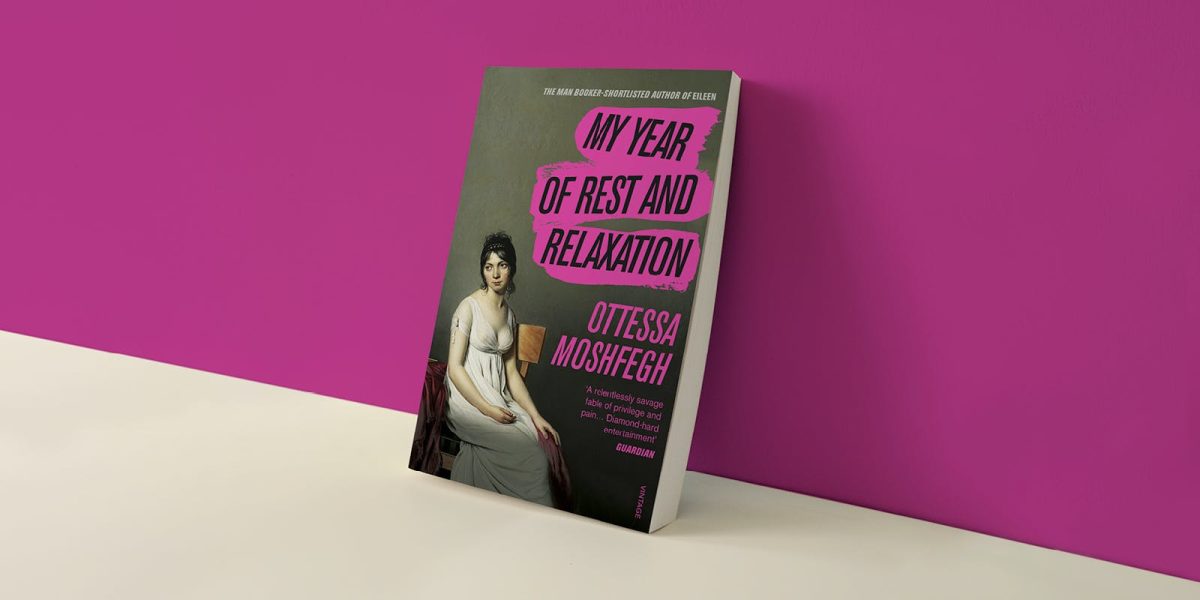Ottessa Moshfegh’s quintessential sad-girl novel reads obsessively, like rubbernecking a car crash for 304 pages, leaving you with bloodshot eyes and a confused reflection in the mirror as you wonder how you could become so fascinated with someone so flawed. Our main character hails from a life of privilege. She comes from money, attended Columbia University, and constantly reminds the reader of her beauty through self-acknowledgement and the range of reactions it elicits from others, like lust and jealousy. As glossy as the protagonist’s (antagonist’s?) image reads, when we first meet her, she is orphaned and aimless, solely concerned with using her privilege to sustain a life that consists of drugging herself into listless sleep with whatever she can get her hands on. She hunts down an unstable psychiatrist, Dr. Turtle, who seems to have several cats and a slew of insurance scams under her belt. She does not vet our protagonist’s lies about experiencing insomnia, ultimately prescribing her with whatever she requests. Now the scene is set: our pretty, thin, blonde narrator begins her journey into nothingness.
“No fair,” says Reva each time good things happen to our narrator. Reva, the other central character of the novel, is a college friend who punishes herself by being in such close proximity to the main character — by being a tongue’s length away from someone who has everything she desires. Moshfegh never shies away from the truth about the shallow, desperate strings that stitch these women together. Everything good that happens to our narrator is ‘no fair’ to Reva, while everything good that Reva does for our narrator is insufferable to her. Reva is the only person to check in and worry about her. While it’s true that Reva mostly comes over to vent, and seeing someone who has bested her in all aspects of life wither away makes her feel better about herself, she is still physically present, letting herself in with the key that she was given at some point in time. And despite what our narrator will say about Reva — about how shallow, pitiful, and sad she is — she needs her friend. They are both terribly lonely. Reva masks this reality by playing the role of a best friend; our narrator masks it by pretending their relationship is beneath her. Sometimes, it’s hard to distinguish proximity from care and connection, especially when our narrator is unreliable and utters drugged-up ‘I love yous’ or is showered with adoration when she accidentally attends Reva’s mother’s funeral. But I think it is Moshfegh’s intention to conflate loneliness and selfishness with love. If you slam two tired, desperate souls together, they are going to cling to whatever parts of the other they need, and they are going to give each other the spare keys to their homes.
The only time we know our narrator uses said key is in a frantic fit of rage, including a threat to kill herself and in a search for the drugs that Reva stole and hid from her in an attempt to prevent whatever her friend was plunging into. It’s perhaps the most expressive we see our narrator when her flat affect becomes a menacing, vicious one instead. Usually, she internalizes and rationalizes her emotions, sanding down mountains of feeling into weak grains of sand that are too small to mean anything. This method of coping makes sense, considering she is solely occupied with numbing herself into the edges of oblivion. As she makes this reality, spilling into deeper and longer sleep, she further disregards the world and those around her, partially evidenced in her maltreatment of Reva. This, however, is where the readers’ obsession kicks in. When we watch her disregard life, intentionally lose days, and burn bridges, a certain amount of satisfied cynicism bubbles beneath our skin. Active members of society cannot grossly neglect their lives like this. We are too often swallowed by an obligation to do anything but fulfill or worry about our lives. Our main character has the luxury of not worrying about any obligations and believes she is tethered to nothing substantial — watching her plunge becomes cathartic.
We do not, however, root for her descent into darkness. Despite her selfishness and hypercriticism of others, we pity her. Neither of her parents cared for her — her father joyously drowning in academic work and her mother too spiteful and resentful to love anything but liquor. Our narrator’s emotionlessness is both a learned behavior and a coping mechanism. These figures, who are supposed to love and cherish her, treat her like an outdoor pet, sometimes bothering to acknowledge her and other times letting her scratch at anything in hopes of gaining their attention. When they both pass, she seeks to further cope by drawing deeper into herself, blocking everything out, and being ruled by sleep. I do not think, however, that she is necessarily grieving the loss of her parents, but rather, she is grieving the loss of never being able to convince the people who raised her that she is worthy of their expressed love. Now that they’re gone, there are no longer any games she can play to convince them that she deserves to be known, and in order to survive, she needs to stifle this grief into a coma.
In the end, her induced bouts of sleep end up working as she emerges from it changed, lounging in a time that is now lush with opportunity instead of soul-crushing. The last chapters tell us that Reva has been lost in the World Trade Center during the tragedy of 9/11 while our narrator was at home burning the news onto a VHS tape. She confesses that when life becomes too overwhelming again, she plays back the tape to watch a woman who might be Reva jump from the tower. Here, we see her compartmentalizing her grief by imposing her distress on the final moments of this beautiful woman whom she reveres for leaping into the unknown. It feels a little exploitative for her to use this tragedy to cope with her own turmoil. In this sense, Moshfegh never wants us truly satisfied; even when the main character is on her feet, we are put off by her. However, Moshfegh’s conclusion sticks because she uses the narrator as a vessel to claim that there is a wonder in decision-making, in playing an active role in your own life without being aware of what might emerge as a result. The unknown is terrifying and paralyzing because it could become anything, but it is equally beautiful for the same reason.
Image courtesy of Penguin Books Australia










